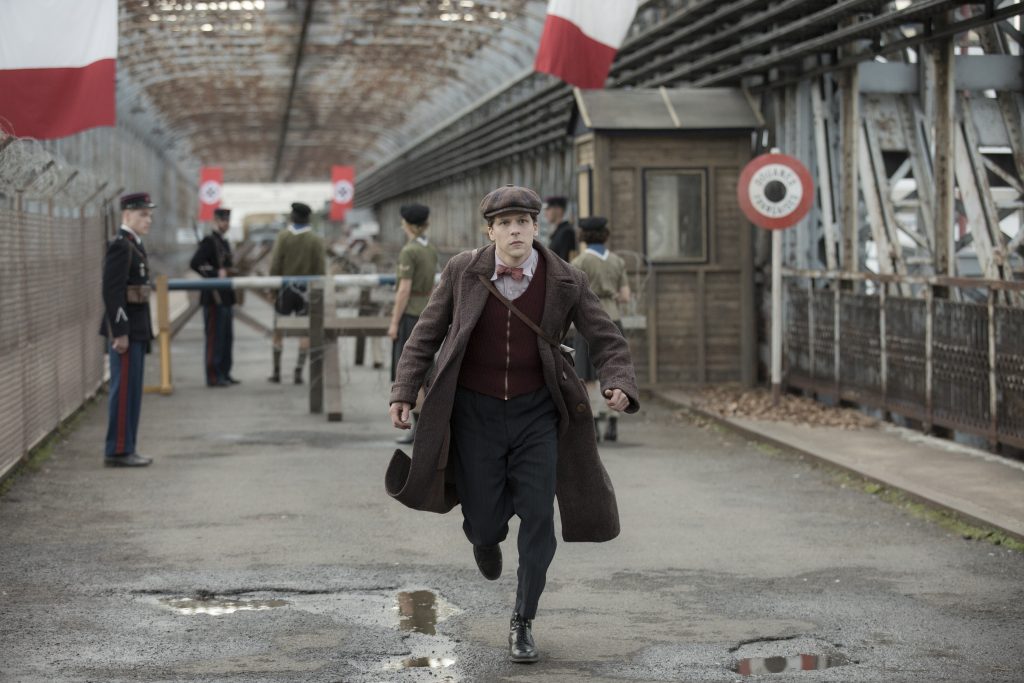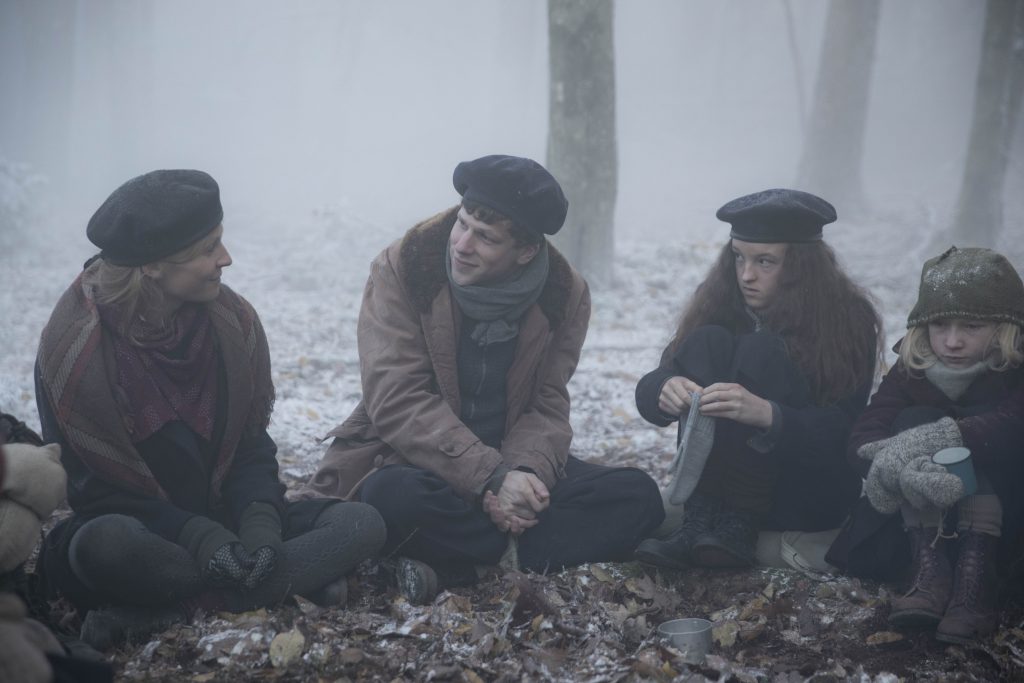March 27, 2020
by Carla Hay

Directed by Jonathan Jakubowicz
Culture Representation: Taking place primarily in World War II-era France, “Resistance” has a predominantly white cast of characters in a dramatic film inspired by the true story of a young Marcel Marceau and his involvement in the French Resistance movement against the Nazis.
Culture Clash: Marcel, whose artistic dreams are discouraged by his skeptical father, is at first reluctant to join the French Resistance, but he and others in the Resistance end up risking their lives in their fight against the Nazi regime.
Culture Audience: “Resistance” will appeal mostly to people who have an interest in World War II stories or inspirational biographies told in a melodramatic way.

People who know about Marcel Marceau as one of the world’s most famous mime entertainers might or might know about his involvement in the French Resistance that saved thousands of Jewish people’s lives during the horrors of the World War II-era Holocaust. The emotionally riveting melodrama “Resistance” primarily tells the story of this part of Marceau’s life from 1938 to 1942 (when he was 25 to 29 years old), and his transformation from aspiring entertainer to war hero.
The movie (written and directed by Jonathan Jakubowicz) begins on November 9, 1935, in Nazi-controlled Munich, Germany. A Jewish mother and father (played by Aurélie Bancilhon and Edgar Ramírez) lovingly kiss their 14-year-old daughter before she goes to sleep for the night. But their lives are shattered when Nazis break into the home, kidnap the parents, and murder them in the street before the terrified daughter’s eyes. What happens to this girl is shown later in the story.
Meanwhile, the movie flashes forward to 1945 in Nuremberg, Germany, with U.S. General George Patton (played by Ed Harris) addressing a large group of American soldiers in a stadium. Patton says he’s going to tell them a story about “one of those unique human beings who makes your sacrifices and heroism completely worth it.”
It’s then that the story of Marceau begins in Strasbourg, France. It’s November 1938, when he was known by his birth name, Marcel Mangel. Marcel (played by Jesse Eisenberg) doing a mime impersonation of Charlie Chaplin on stage at a cabaret. No sooner does he get off the stage, he is pulled out into an alley by his disapproving father, Charles Mangel (played by Karl Markovics), an immigrant from Poland who thinks Marcel is wasting his time trying to be an artist. Charles wants Marcel to follow in his footsteps in the family’s butcher business, which Marcel does reluctantly as a “day job.”
Meanwhile, one of the butcher shop’s female customers has a daughter named Emma (played by Clémence Poésy), who Marcel asks about when she comes into the store. Marcel jokes that his father wants Marcel to marry Emma, but viewers can see from the Marcel’s demeanor when he sees Emma later that he doesn’t need any parental interference to be interested in her. They have the kind of back-and-forth “I’m trying to play it cool but deep down I’m attracted to you” banter that would-be couples have in movies when you know that there will be some romantic sparks between them later.
Emma and her sister Mila (played by Vica Kerekes) are part of the underground French Resistance movement that includes Marcel’s cousin Georges Loinger (played by Géza Röhrig), who was the head of the Jewish Boy Scouts during World War II. Georges, Emma, Mila and Marcel’s older brother Alain (Félix Moati) are all involved in helping rescue orphaned Jewish children and finding them a place to live.
Georges has asked Marcel to use his mime skills to entertain the children, but Marcell initially says no because he wants to use his free time to work on a play and his other artistic interest of painting. Marcel and Alain come from a tight-knit Jewish family (their parents have a solid marriage), but Alain and Marcel have a strained relationship because Alain thinks that Marcel is too self-centered and arrogant.
And the movie shows that Alain is right. Even though Marcel is a mime on stage, he hates it when people call him “a clown.” As he tells his father haughtily, “I’m an actor!” Marcel also thinks that he’s too good to be a butcher and he’s destined for greatness as a famous and respected artist. No one can tell him otherwise.
But when a group of 123 orphans arrive in Strasbourg, and Marcel volunteers to borrow his father’s truck to transport them to an abandoned castle where the orphans will be staying, it sets in motion a life journey that at the time Marcel didn’t even know that he would be taking. In this group of orphans is a teenager named Elsbeth (played by Bella Ramsey), and she’s the same girl viewers saw in the beginning of the film. Elsbeth ends up bonding with Emma, who acts like a surrogate older sister to Elsbeth.
While at the castle, the frightened orphans are slowly put at ease by Marcel’s mime antics. It’s during these performances that Marcel realizes that he can use his art for something more important than his own career ambitions. However, Marcel still doesn’t want to give up his dreams of being an artist.
One day, while Charles watches his son Marcel working on a painting, he asks Marcel, “You dress like a clown. You paint a clown. Why do you do it?” Marcel replies, “Why do you go to the bathroom?” Charles answers, “Because my body gives me no choice.” Marcel tersely says before he walks out of the room, “There it is. That’s my answer.”
However, Marcel’s artistic dreams are put on hold when it becomes clear that the Nazis are getting closer to invading the region of France where he lives. Alain tells the others that they need to train the children to survive. And sure enough, the Nazis order the evacuation of the border towns in France. The Mangel family, like so many other Jewish families in the region, comply and think that they will eventually be allowed to go back to their homes. Tragically, they are mistaken.
It’s 1941. And while in France’s city of Limoges in Vichy, Marcel puts his precise painting skills to good use and finds out he has a knack for forging passports, which he does for himself and several fellow Jewish refugees. It’s during this period of time that he changes his last name to Marceau, in order to hide his real Jewish surname.
Meanwhile, Marcel and Emma have gotten closer, while Alain and Mila have started their own romance. Along with Georges, they are all still heavily involved with helping orphans find a place to live. And it’s around this time that Alain and Marcel officially decide to join the Resistance. They tell their father, who is supportive.
As this is going on in France, viewers are then taken to Berlin, where Nazi lieutenant Klaus Barbie (played by Matthias Schweighöfer) is inflicting violence and terror on Jews and some of his fellow Nazis. (In one brutal scene, he viciously beats another Nazi in front of others because the man is gay.) The movie shows that this sadistic Nazi has a soft side when it comes to his family (he has a wife and baby daughter), which illustrates how several Nazis had the duality of being heartless murderers but also loving family men.
Before the end of the movie, Marcel and his group have a lot of harrowing, heartbreaking and life-threatening experiences. “Resistance” is not an easy film to watch if you’re extremely sensitive to seeing terrifying acts of murder and torture. It makes it all the more painful to watch because these are re-enactments of what millions of Jews and other people went through in real life.
And the movie also shows that the Nazis were not the only people to blame for the Holocaust. An untold number of non-Jewish people in Nazi-occupied countries betrayed their fellow Jewish citizens by giving up information about them for cash or other rewards. “Resistance” effectively shows how the culture of complicity allowed the Nazi reign of terror to thrive for as long as it did.
Although this is certainly an important story to be told, “Resistance” might have some people rolling their eyes at the melodramatic tactics used in telling the story. There’s a scene where one of the main characters goes missing and is found in a big city, just at the moment when this person is about to jump in front of train in a moment of suicidal despair and is rescued from committing that deadly act. This kind of too-good-to-be-true coincidence looks like it was fabricated just for the movie.
And in another part of the story that doesn’t make much sense, one of the characters is captured and tortured by a Nazi and then inexplicably allowed to leave. In reality, this person would’ve been killed, but it seems that this person’s life was spared in order to further the plot in another part of the movie. However, it’s one of the few parts of “Resistance” that doesn’t ring true. The rest of the film, which unabashedly tugs at people’s heartstrings, tells the story in a way that could have reasonably happened in real life.
“Resistance” director and Jonathan Jakubowicz and cinematographer M.I. Littin-Menz imbue the film with a sense of urgency in the war scenes and a sense of dramedy in the more light-hearted scenes. There are many sweeping shots at 360-degree angles that give the viewers a head-spinning overview of what usually is a pivotal scene in the story. But even with these artsy camera tricks, the movie doesn’t trivialize the dark side of this story.
As Marcel, Eisenberg gives a compelling performance, even if his real-life American accent occasionally slips out in the dialogue. He convincingly portrays Marcel as someone who evolves from thinking that nothing is more important to him than his art to realizing that there are other ways that artists can make an important difference in the world without giving up their passion for art. (Eisenberg’s mother was a clown in real life, so doing the mime scenes must have had special meaning for him.) “Resistance” is undoubtedly a story about how someone can triumph over tragedy, but it’s also a reminder that the horrors of the Holocaust must never happen again.
IFC Films released “Resistance” on digital and VOD on March 27, 2020.
